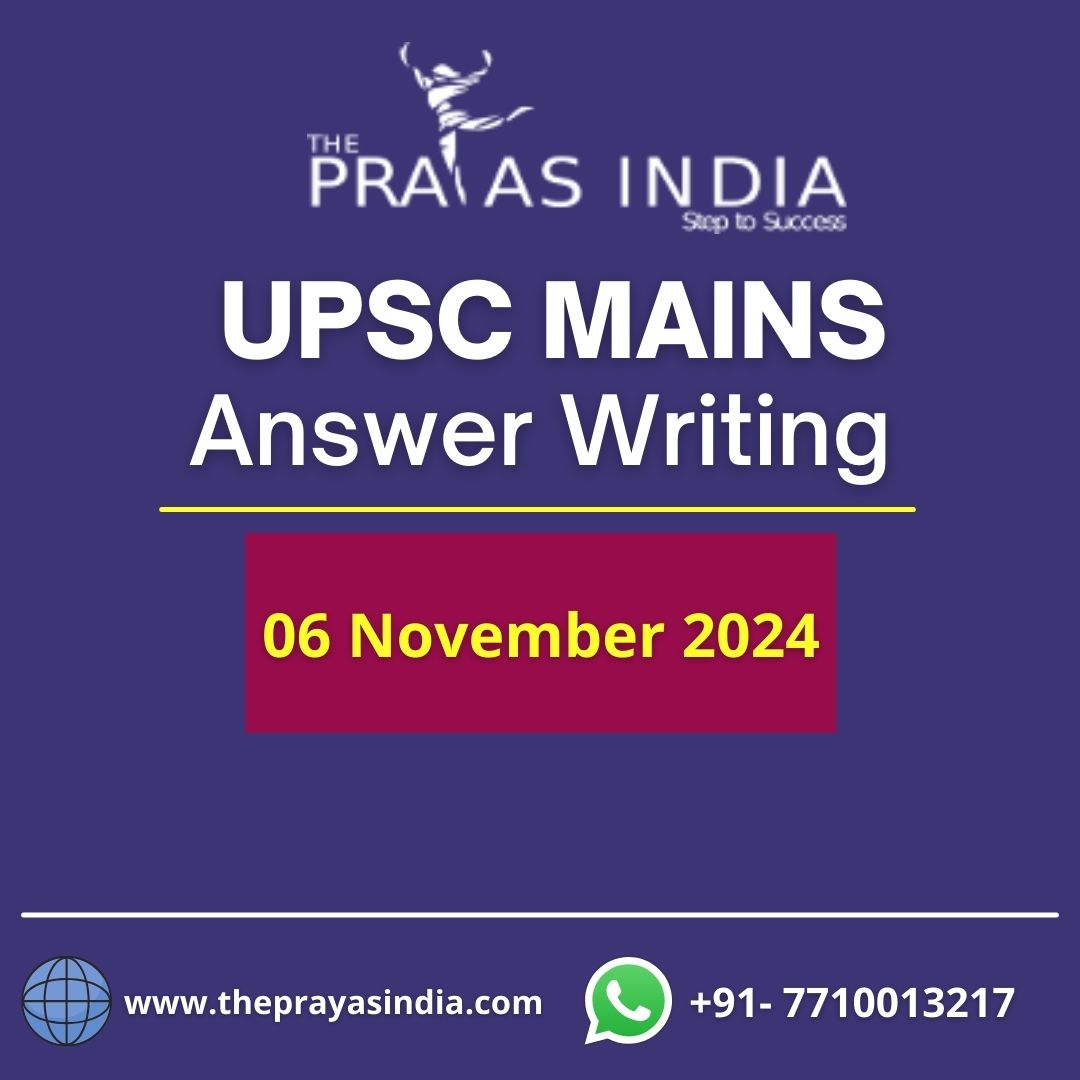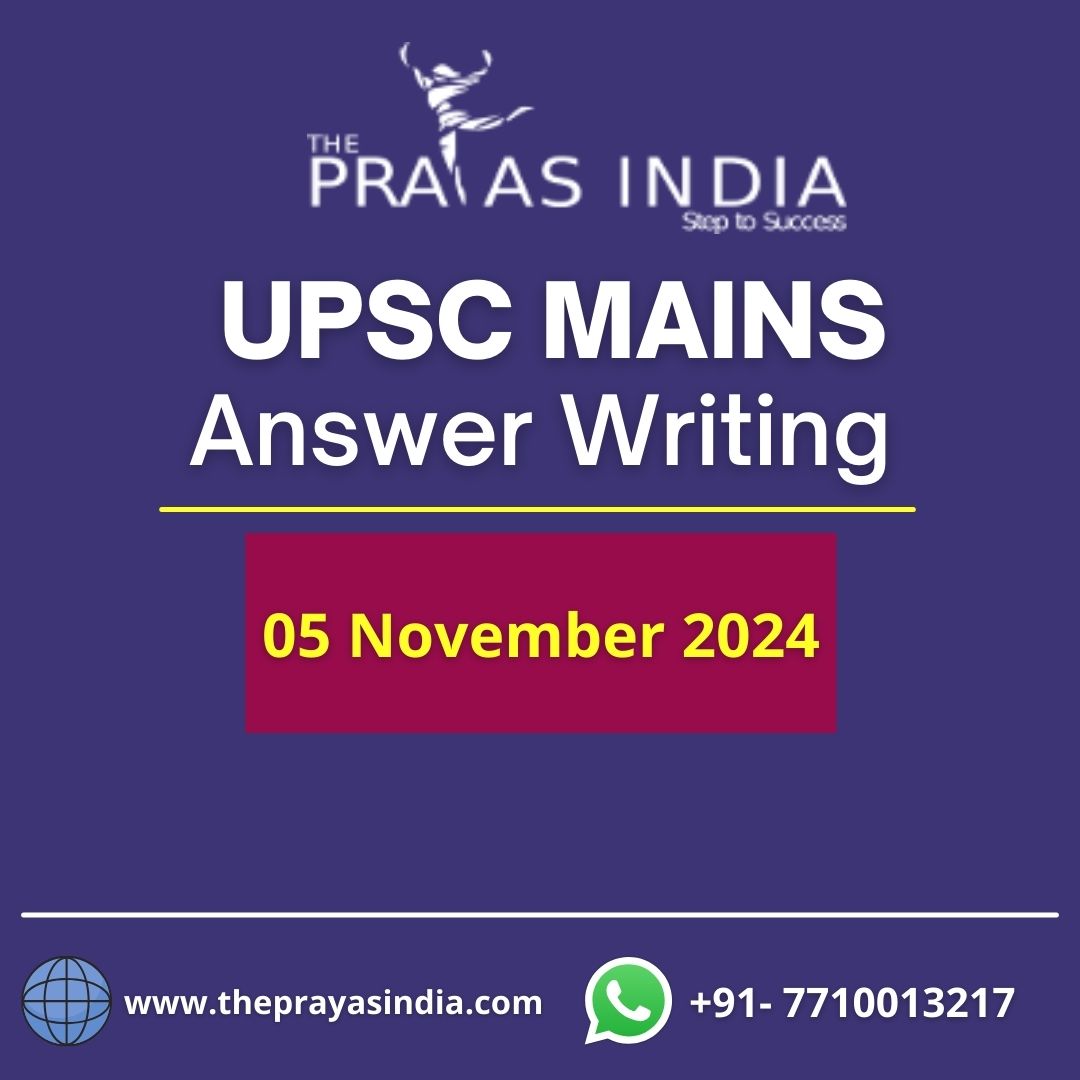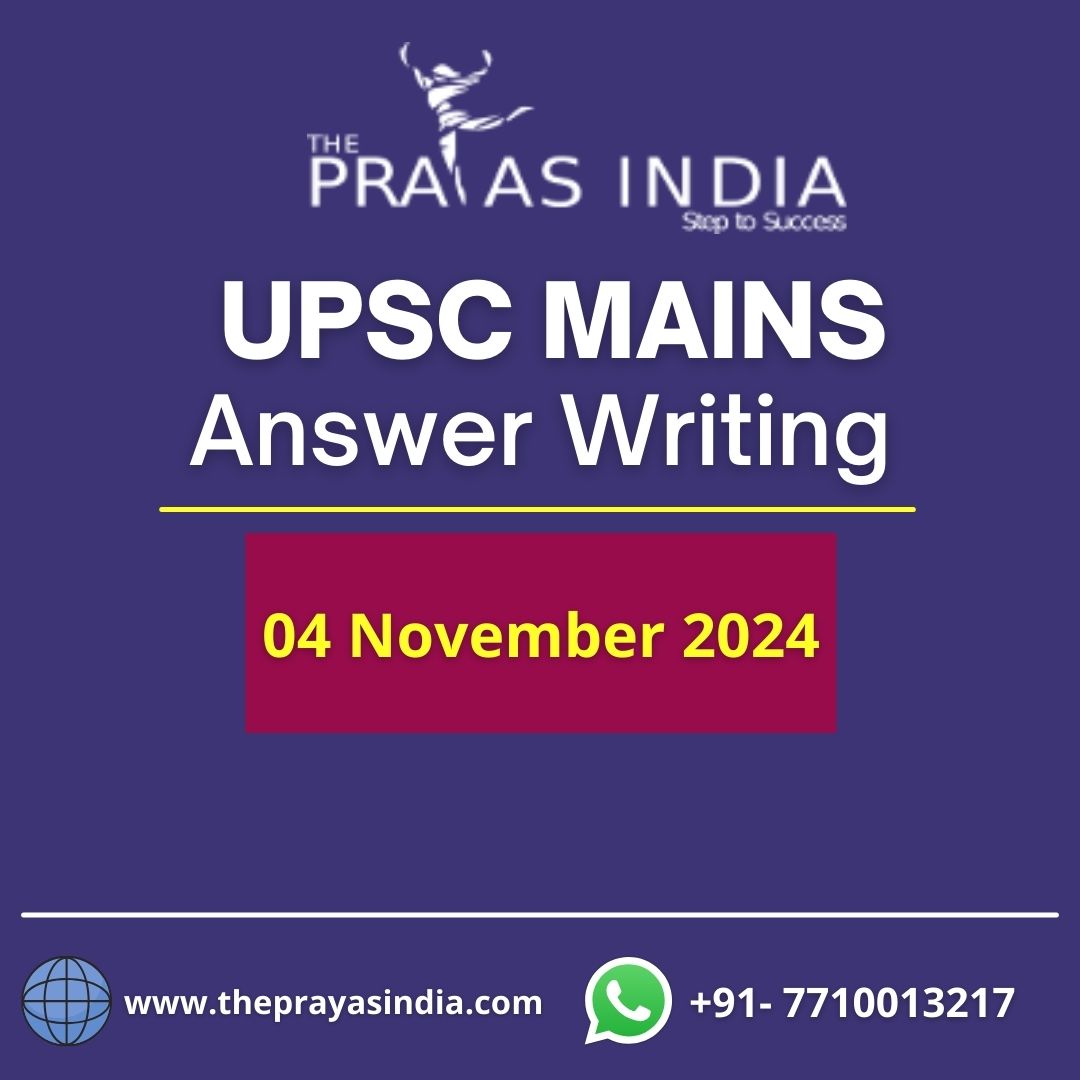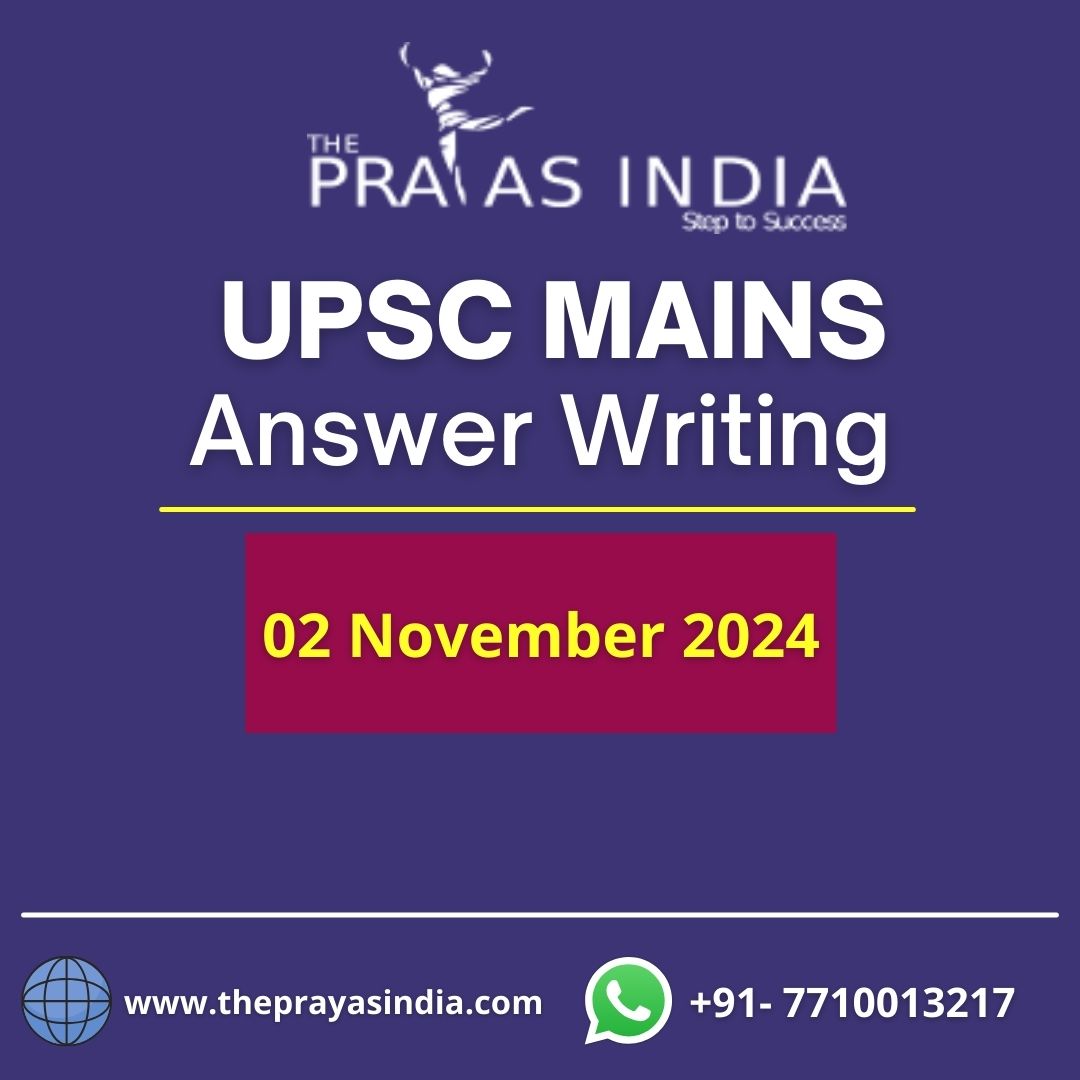MAINS DAILY QUESTIONS & MODEL ANSWERS
Q1. Describe what the Vice-President of India does and how they do it. What part can the Vice-President play in making things better between the opposition and the government?
GS II – International Relations
Introduction:
- “There shall be a Vice-President of India,” says Article 63 of the Indian Constitution. The second most important job in India’s government is that of Vice-President. That person is in office for five years, but they can stay until their replacement takes over, even if the five years are up.
- Article 68 of India’s Constitution says that an election must be held before the end of the term to fill the Vice-President’s seat, which will become vacant when their term ends.
What the vice president of India does and how they do it:
- Article 64 says that the Vice-President “shall be ex officio Chairman of the Council of the States” (Rajya Sabha).
- Article 65 says that “if there is a vacancy in the office of the President due to his death, resignation, removal, or otherwise, the Vice-President shall act as President until the date on which a new President…enters upon his office.”
- The Vice-President will also do the President’s job when the President is “absent, sick, or for some other reason” unable to do so.
- The Vice-President will “have all the powers and immunities of the President and be entitled to emoluments, allowances and privileges” that are due to the President during this time.
- There is a law order that says the Vice-President of India is the second most important person in the country, after the President.
- You can’t argue that someone shouldn’t have been elected Vice-President because the electoral college wasn’t full (i.e. there were empty seats in the electoral college).
- If the Supreme Court says that someone’s election as Vice-President is invalid, then things that person did before the date that the Supreme Court said that his election was invalid are still legal.
- The Vice-President is automatically the head of the Council of States. If there is a tie, he can cast his vote.
- On official events, he speaks for the Council of States.
- The members of the Council of States trust him to protect their rights and freedoms.
- He goes to other places on missions of goodwill.
- Vice-President should make sure that Parliamentary processes don’t get stuck all the time, that MPs aren’t suspended for no reason, and that the ruling party and the opposition parties can still talk to each other.
- The vice president should make sure that the government doesn’t keep getting around the Rajya Sabha when making important laws by calling certain bills “money bills.”
- As Chairman, it should be more of his job to protect the Opposition’s room and debates and make sure the executive is held accountable.
- The swearing in of the new Vice-President should give people hope for parliamentary democracy again.
- There is, however, a need for a Vice-President. It is an honour, a dignity, and an honour to be in his situation. He is in charge of the Rajya Sabha meetings. The Vice-President has the same rights, powers, and protections as the President when he or she is in office. He is the “No. 2 Citizen” of the country because of this. But there is a chance that he could be made No.1 Citizen of India.
Q2. Elections that are free and fair are important for a democracy to work because they give people a chance to say what they want and hold their leaders responsible.
GS II – International Relations
Introduction:
- In electoral democracies, free and fair elections turn the choices of voters into a political mandate that guides decisions. Voting systems that are more accurate and work more efficiently make political institutions stronger. The Representation of People’s Act, 1951, which controls elections, is not strong enough to stop political crimes.
Why free and fair elections are important:
- Democratic Government: India is the biggest democracy in the world, and for its democratic government system to work, it needs free and fair elections. People can have a say in what decisions are made, choose who will serve them, and help shape the direction of the country through elections.
- Diversity: India is very different from other countries in terms of culture, language, religion, and socioeconomic status. Free and fair elections make sure that all of the people who live in a country are properly reflected in politics. This keeps one group or community from becoming too powerful.
- Holding Leaders Responsible: Elections are a way to make leaders responsible for what they do. Voters can say whether they like or dislike how political parties and leaders are doing through the voting process. This makes sure that chosen officials stay in touch with what the people want and need.
- Protecting the rights of minorities: India is home to many religious and racial communities. Making sure that minorities’ views are heard and taken into account in the political process through free and fair elections helps protect their rights. This openness is very important for keeping the peace and making sure that no group is left out.
- Change of Power Without Violence: India has a long history of changing power without violence. This is helped by free and fair elections, which let people change the government in a democratic way. This helps keep the political system stable and stops authoritarian traits from taking hold.
- Principles of the Constitution: Democracy, equality, and fairness are written into the Constitution of India. These constitutional goals are shown through free and fair elections, which give people a way to be involved in government and make sure that political power comes from the people.
- Elections encourage civic involvement by making people more aware of politics, starting conversations in public, and getting people involved in the democratic process. As people learn more about political problems and policies, they become more active and well-informed voters.
- Resolution of Conflicts: Free and fair elections are a calm way to settle political and social disagreements in India, which has a lot of different cultures and ethnic groups. The voting process gives people with different goals a chance to work out their differences and find a solution through democratic means.
- International Reputation: India’s dedication to free and fair elections makes it look like a stronger and more lively democracy around the world. A strong democratic image helps with international ties and builds peace around the world.
Problems with the Indian elections:
- Expenditure: What makes people spend money on elections? True campaigning costs, party running costs, and TV show time costs.
- However, the legal spending that has been recorded is only a small part of what the candidate and their political parties actually spent. The National Commission to Review the Working of the Constitution (NCRWC) study says that the high cost of elections makes people more likely to be corrupt in public.
- Freebies: More attempts to get people to vote by offering short-term benefits (in the form of popular plans to win elections) at the expense of good government, which also hurts the long-term interests of the poor and middle class.
- Vote-buying: The rise in illegal spending on vote-buying is very worrying because it makes rich people more likely than educated, good-hearted people to become MPs or MLAs.
- Out of the 533 candidates chosen to the 17th Lok Sabha (2019–present), 475 (88%) are “crorepatis,” as you can see. This shows how strange it is that India is poor while rich lawmakers are worried about the growing influence of money in politics.
- Any news or opinion that is published in any form (print or electronic) for a fee, in cash or kind, is called “paid news.” Paid News is a problem that changes the playing field and gets around the limits on election spending. This makes it harder for the Election Commission of India (ECI) to hold the run-off polls in a free, fair, and open way.
- Criminalization of politics: This is when bad people get involved in politics by running for office, winning, and then taking up public office. This happens because there is a strong link between criminals and some leaders who take advantage of the system’s flaws.
Reforms Needed:
- State funding of elections is a system in which the state pays for the election costs of the groups running for office. This can make the funding process more clear because public finance can limit the power of donors’ money, which can help stop cheating.
- Polls Happening at the Same Time: Now is the right time to use simultaneous polls because they have many benefits, such as lowering the costs of elections for both the ECI and the parties.
- Important laws: In the Public Interest Foundation & Ors. vs. Union of India 2018 case, the Supreme Court told the Parliament to make a rule to stop making politics a crime and work together to clean up the country’s political system.
- It’s time to make good laws like the Fiscal Responsibility and Budget Management Act of 2003 (FRBMA, 2003), which limits the budget gap.
- If a cap is introduced on populist announcements (based on the proportion of budgetary resources they have) by the parties within the ambit of law, then perhaps all political parties will have a level playing field and the unsustainable populist measures could be kept under check.
- In its 255th Report on Electoral Reforms, the Law Commission suggested, among other things, that the office of the ECI be strengthened to give the organisation more independence and strength.
- The “First Past the Post System,” which says that the winner is the person with the most votes, even if that person gets one more vote, needs to be changed. Rather, a minimum percentage of total votes polled can be fixed for declaring a candidate as the winner. The criminals might not be able to get chosen because not all people in a district vote the same way.
- It is time for the Right to Information Act (RTI Act, 2005) to cover political groups as well.
- All parties should be given equal media space or air time so as to provide a level playing field.
- Free and fair elections are the bedrock of any healthy democracy. But conducting free and fair elections is easier said than done. In a huge and diverse country like India, it is much more complex and challenging. Humongous logistics issues in terms of material and manpower are involved in the entire process. Free and fair elections need to provide level playing field to all the players in the game. The entire electoral process should be capturing true mood of the electorate. This is possible today with technology and technology must be accessible to all before this can truly be called as fair.




